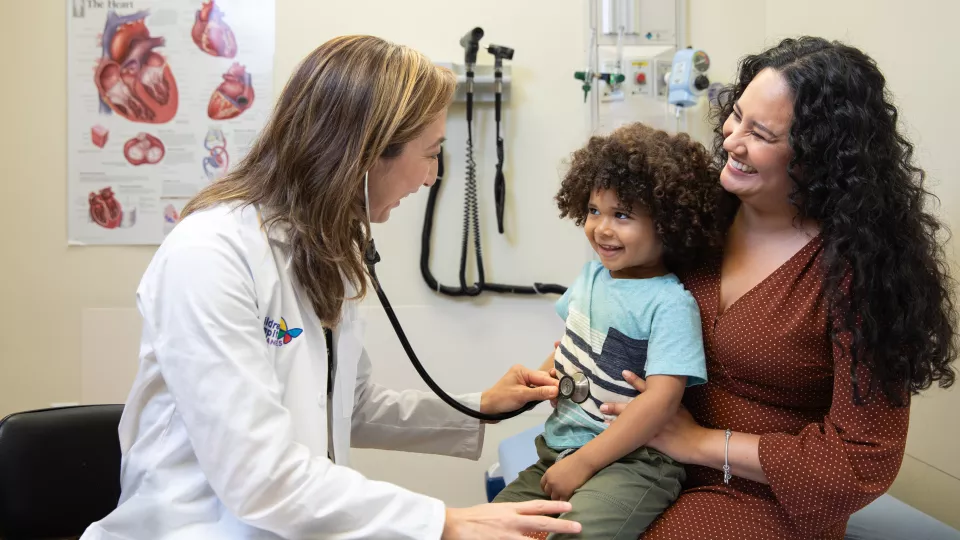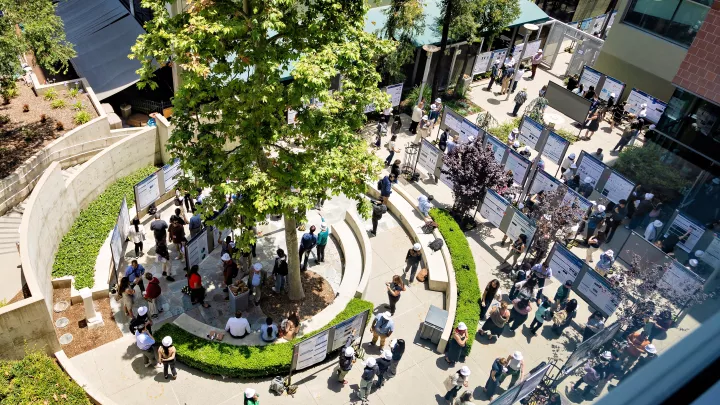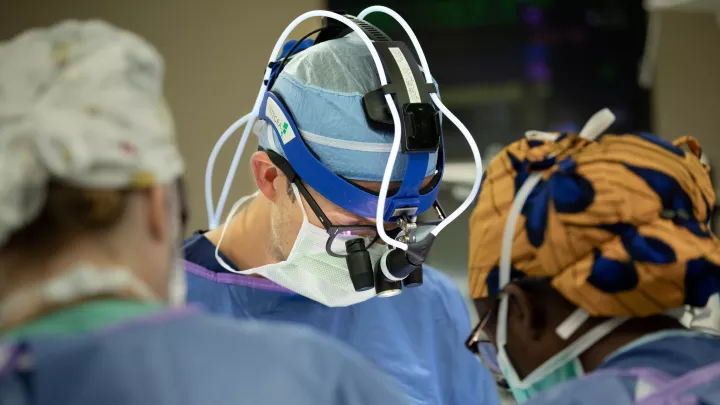
Jennifer Su, MD, with a young child and mom
5 Things Physicians Should Know About Pediatric Heart Failure
Pediatric heart failure is a progressive and life-threatening condition that can have a high mortality rate. Fortunately, thanks to new therapies now available, many children can recover—but this condition needs early recognition and treatment.

To help improve providers’ ability to diagnose and manage pediatric heart failure, Children’s Hospital Los Angeles recently hosted the Pediatric Acute Heart Failure Symposium. The all-day event provided the latest guidance on this condition, along with hands-on experience with point-of-care ultrasound, ventricular assist devices and extracorporeal membrane oxygenation (ECMO).
Held May 18 in Los Angeles, the event attracted nearly 150 providers. It was chaired by Paul F. Kantor, MBBCh, MSc, FRCPC, Chief of Cardiology and Co-Director of the Heart Institute, and Jennifer A. Su, MD, Medical Director of the Cardiomyopathy and Heart Failure Program at CHLA. Here, they share five key learnings from the symposium.
1. Early recognition and care are crucial.
One of the main goals of the symposium was to improve providers’ ability to recognize pediatric heart failure in its early stages.
“Early recognition and early intervention are critical,” says Dr. Su. “It’s really important that community providers quickly recognize the signs of heart failure and, if needed, refer them to a specialty center like CHLA.”
Sessions covered both common and uncommon symptoms of pediatric heart failure—including abnormally fast breathing, fatigue, nausea, feeding difficulties and more. In addition, emergency medicine physicians from CHLA shared their expertise, including how they distinguish between symptoms from a common cold or a stomach bug, and symptoms caused by decreased heart function.
“If not recognized early, heart failure in children can progress quickly, and it can be life threatening,” Dr. Kantor adds. “When it is addressed early, many patients make a complete recovery.”
2. Treatments have come a long way.
The symposium’s keynote address was given by Alan Lewis, MD, and focused on the evolution of pediatric heart failure care. Dr. Lewis, a cardiologist at CHLA for 50 years who recently retired, was a leader in this field. He described how providers have learned to recognize heart failure in infants and children, and how the treatment of heart failure has progressed over the last half-century.
“Fifty years ago, most children with heart failure did not survive,” Dr. Kantor says. “Today, we often see complete recovery of these patients, thanks to new medications, devices and when needed, cardiac transplant. It was really helpful for providers to have this perspective of how far we have come.”
3. Multidisciplinary care is key.
“A multidisciplinary approach is essential for these patients,” says Dr. Su. “That is true for both medical and nonmedical needs.”
For example, children with heart failure often need support from dietitians to ensure adequate nutrition. Physical therapists can help a child safely build up more physical strength. And families may need support from psychologists or social workers.
Importantly, the conference featured attendees and speakers from multiple disciplines, including intensivists, emergency medicine specialists, psychologists, dietitians, perfusionists, pediatricians, nurses and more. Faculty included experts from CHLA as well as institutions throughout Southern California.
4. The family is part of the team.
One of the most inspiring presentations came from a patient and mom who described their heart failure journey and recovery at CHLA.
“Each family is a key part of a patient’s treatment success, so we felt it was important to feature a family’s perspective and experience,” says Dr. Kantor. “For me, this was a highlight of the conference and a key take-home message for providers: The family is part of the care team, and we are hearing their voice."
5. Expert help is readily available.
Pediatric heart failure is complex, and care is often not straightforward. The team at Children’s Hospital Los Angeles, for example, often receives calls from physicians who need expert consultation on a case.
Sharing this expertise was one of the goals of the conference, and it’s a key part of the team’s mission.
“We are very open to partnering with community-based physicians, even if it’s just giving our thoughts over the phone,” Dr. Su says. “We encourage all providers to reach out if they need help. We want to make sure that all children are able to receive the best and latest care for this potentially devastating disease.”


